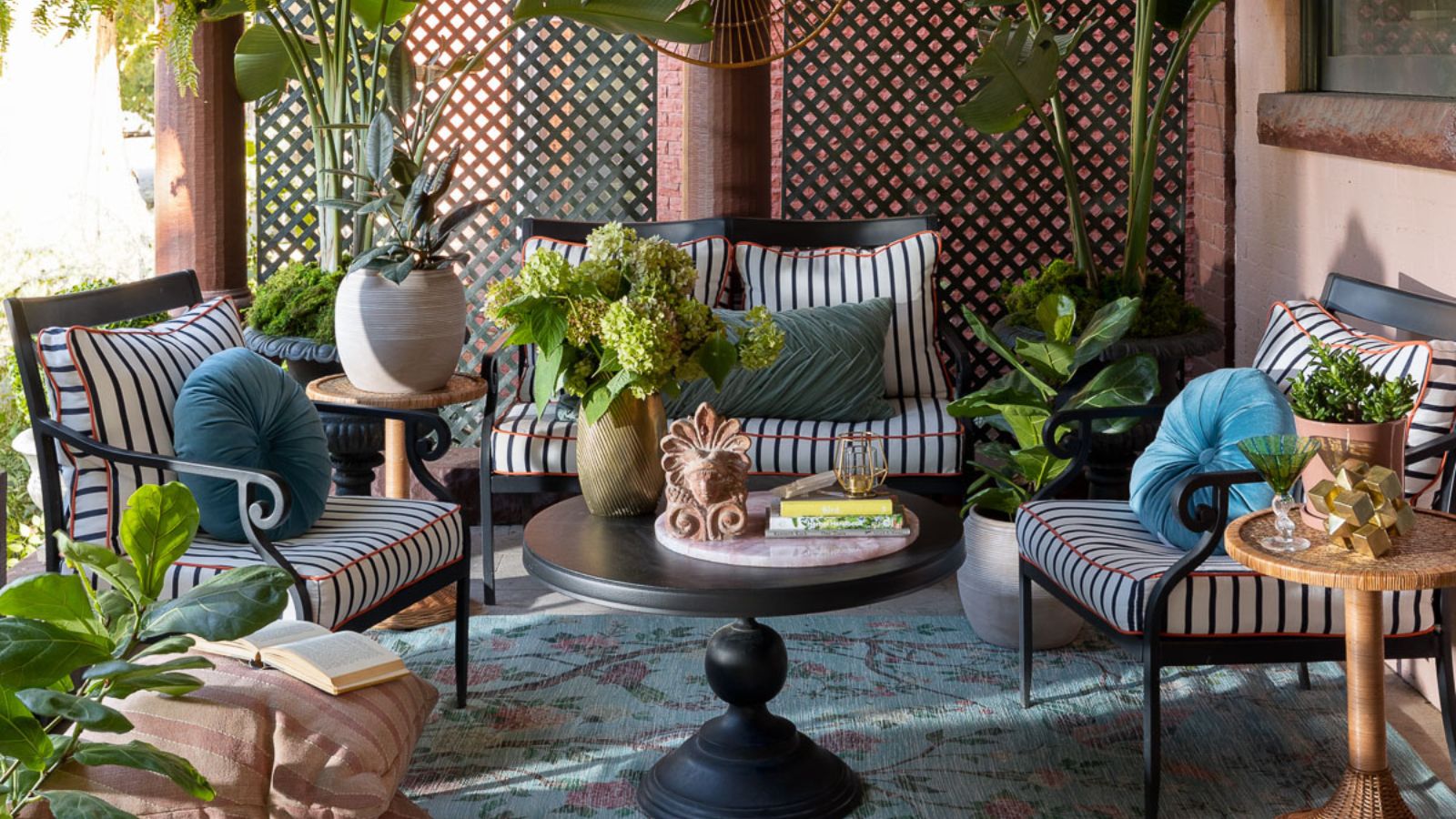
It wasn't until I underwent a total garden makeover last year that I fully understood how much an outdoor living room can not only transform your backyard, but your entire home too.
Creating a dedicated spot for relaxing al fresco not only expands your hosting space but also encourages you to spend more time outdoors (so long as the weather is playing along). With some comfy seating, perhaps a fire pit for cozy evenings, and some twinkly string lights overhead, these backyard ideas can improve the way you entertain, give you a peaceful spot to recharge after a busy day, and make your home feel bigger, breezier, and more connected to nature.
All it takes is a little planning, design know-how, and expert advice. Ready to be inspired? I’ve pulled together 17 expert-led outdoor living room ideas to help you craft a stylish, serene, and truly personal outdoor space you’ll love spending time in.
16 Outdoor Living Room Ideas
To make the most of this ‘extra room’, we must think creatively about how to plan, design, and decorate. An outdoor living area should offer all the comforts and style of an indoor living room, but also be designed with the weather, privacy, and surrounding features such as patios, planting, and lawns in mind.
Any change, big or small, can be transformative, so we asked the experts to share their very best garden decorating ideas, insider tips for finding the best outdoor furniture, and advice on where to start.
1. First, consider how you want to use your outdoor living room
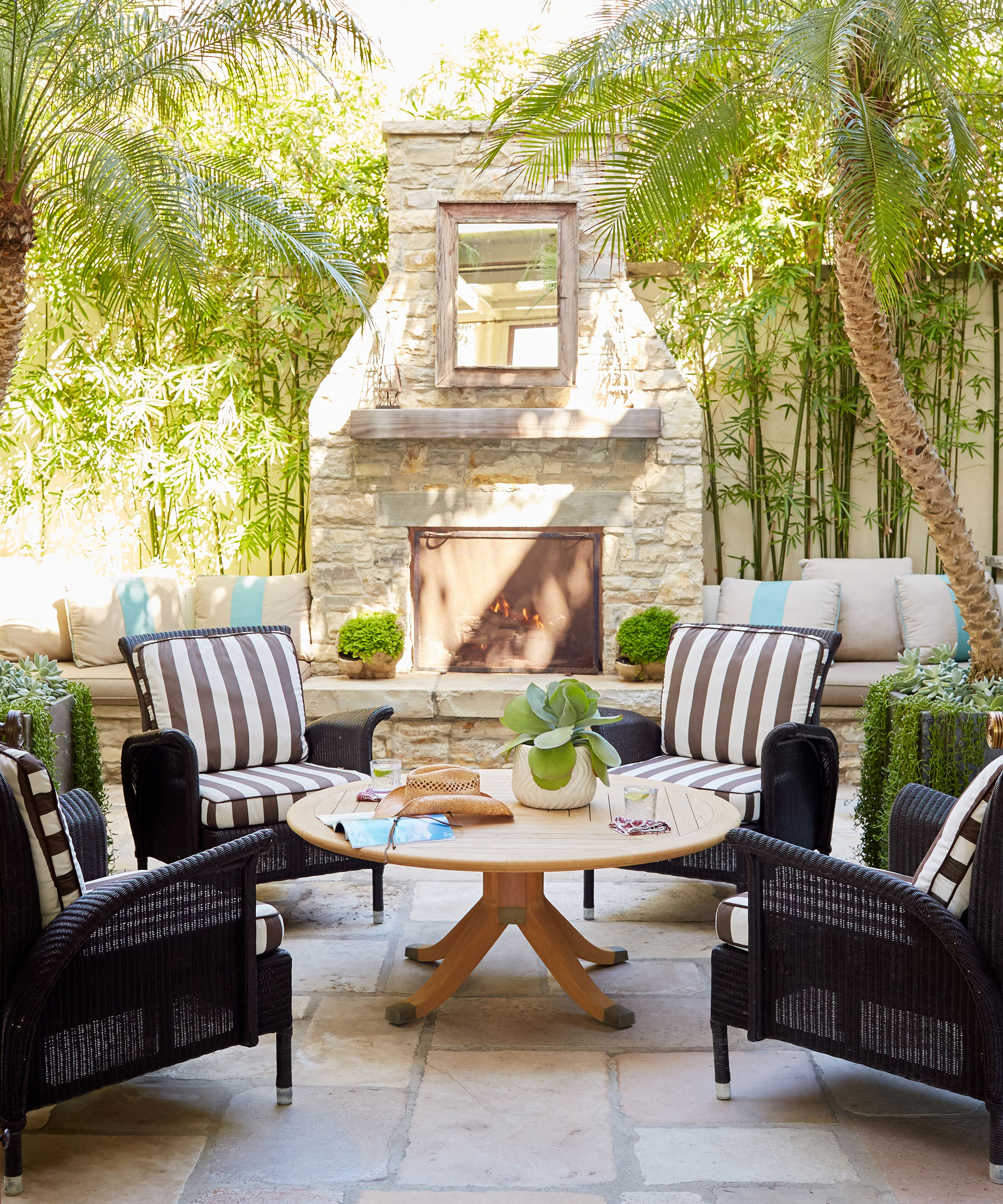
Whether you want to create an extension of your outdoor dining area or you're designing an outdoor living room simply just for relaxing, it’s important to consider what you want the space to offer you.
Is it to be an oasis? A social hub? A hybrid cooking and/or dining space? Created as a relaxing retreat, this area seen above utilizes tall, layered planting and a fireplace chimney to help shut out the rest of the world.
‘The idea was to create a space to get away from all of the external activity,’ says interior designer Tim Clarke, who designed this space. ‘With its fireplace and lush planting, including palms to sit under, a true escape was created.’
2. Be inspired by your indoor living room
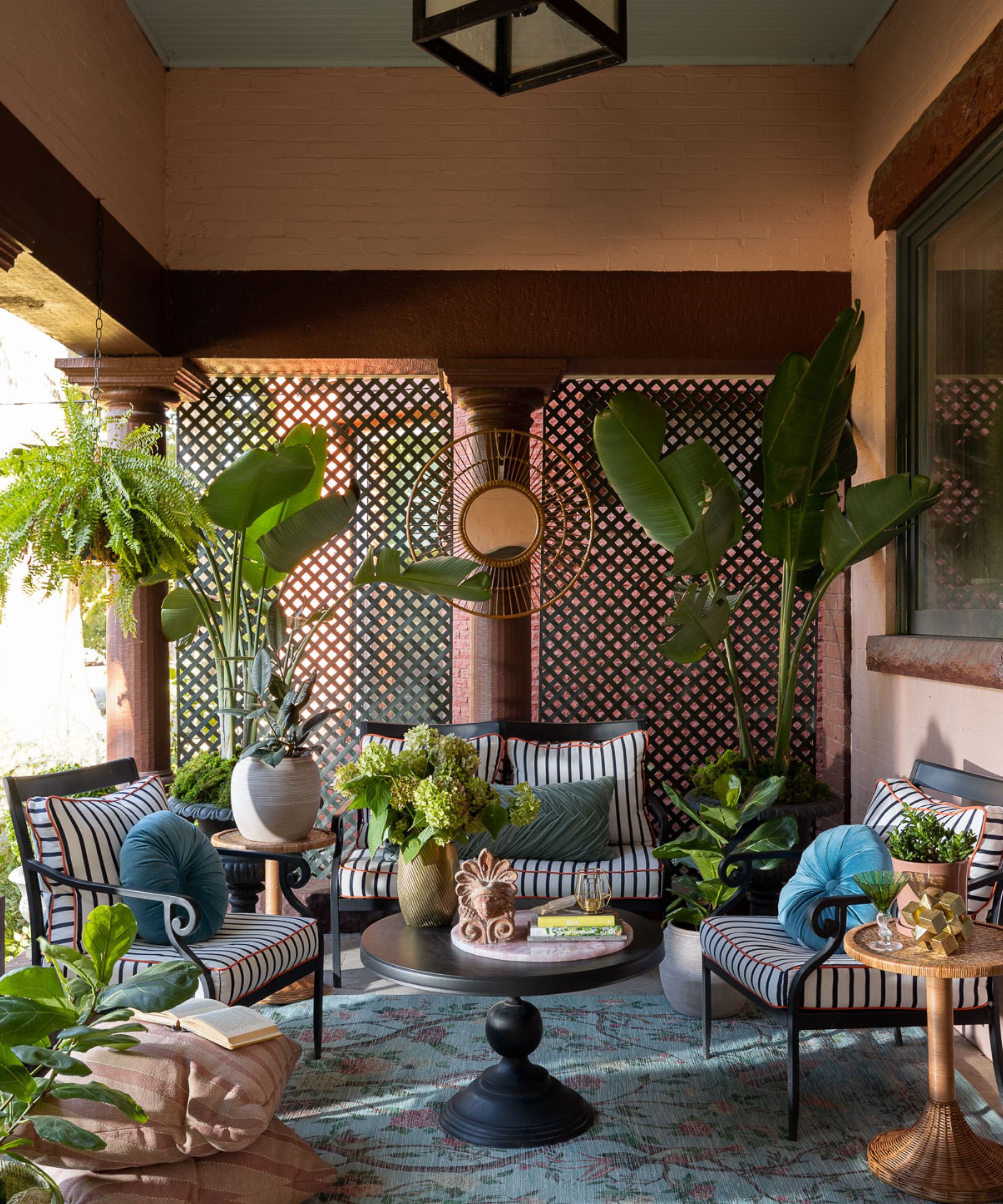
'When designing your outdoor living room, consider how you live indoors and think about how you will use the space,' suggests designer Bethany Adams, who created this boho-style oasis above.
'For example, if you regularly read in your living room, consider adding weather-proof cordless table or floor lamps to your outdoor space,' she adds. 'If you enjoy entertaining, a garden bar is an excellent addition. Just as when designing indoors, consider scale, durability, and comfort.'
By thoughtfully borrowing inspiration from your favorite interior design choices, you can create an outdoor living room that looks and functions just as well as any other part of your home.
3. Find the perfect spot
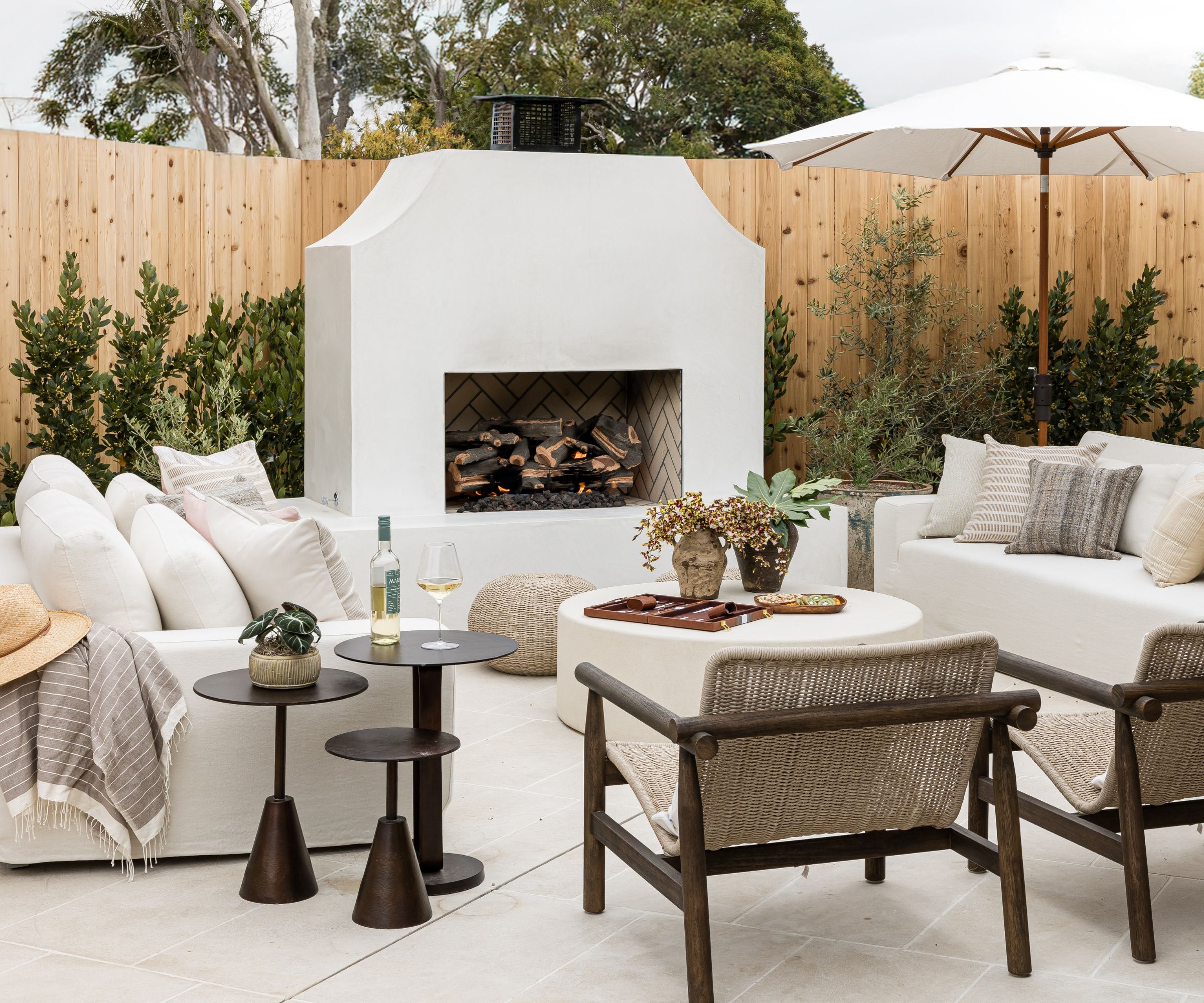
Where and how you plan your outdoor living area will be dominated by surrounding structures and features that you may wish to retain, such as trees, pools, and water features, and existing patios and terraced areas.
Consider the ease of use and access; does it feel ‘natural’ to walk towards the outdoor living area, or would you need additional pathways or steps? Is it oriented to maximize how the sun rises and falls?
Also, consider if there is enough space – or too much – to make the area feel comfortable to relax in? Whilst there are solutions for tight spots, it can be difficult to bring together a larger space effectively, so you may have to figure out how to bring in items such as planters, screening, and shelter to help the area feel less open to the elements.
'I always like to include a sitting area in a secluded spot. It really makes the space your private paradise,' says Susan Spath, president of luxury furnishings company Kern & Company and principal designer of Susan Spath Interior Design.
4. Approach it with a floorplan like you would indoors
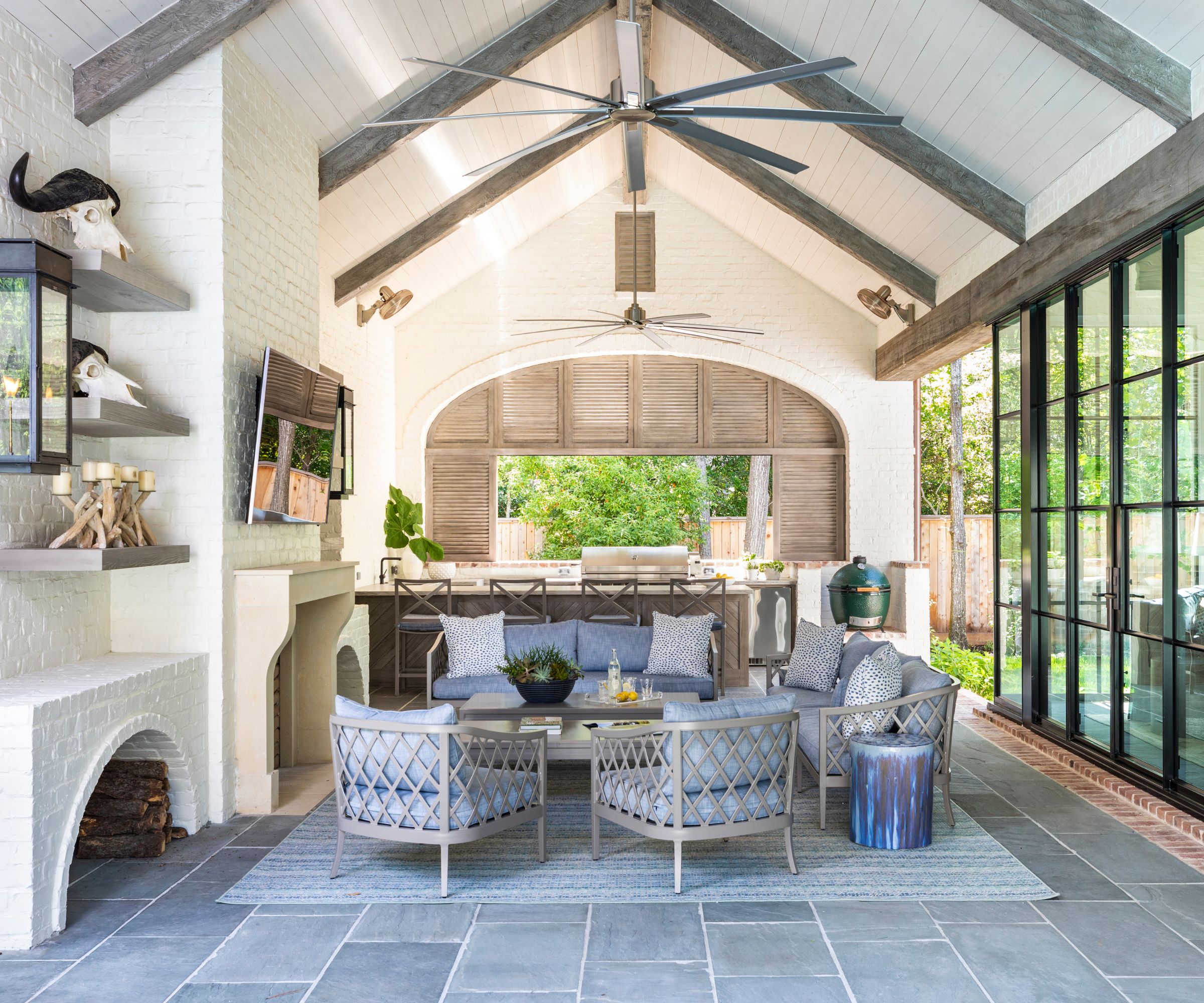
People often make the mistake of seeing the garden as one big, empty space, but by creating defined areas, just as you would inside, you can add depth, interest, and a real sense of comfort.
‘Your garden should always be thought of as an extension of your home, so it’s important to bring the comfort of indoors outside. One way to do this is to divide your outdoor space up by ‘rooms’, with one area for dining and another for relaxing,' says the co-founder and creative director of OKA, Sue Jones.
Breaking your outdoor living room into distinct zones – a cozy lounge corner for relaxing, a dedicated area for entertaining, or a firepit spot for after-dinner drinks – will help you make the most of every inch.
5. Create a seamless design thread with indoors
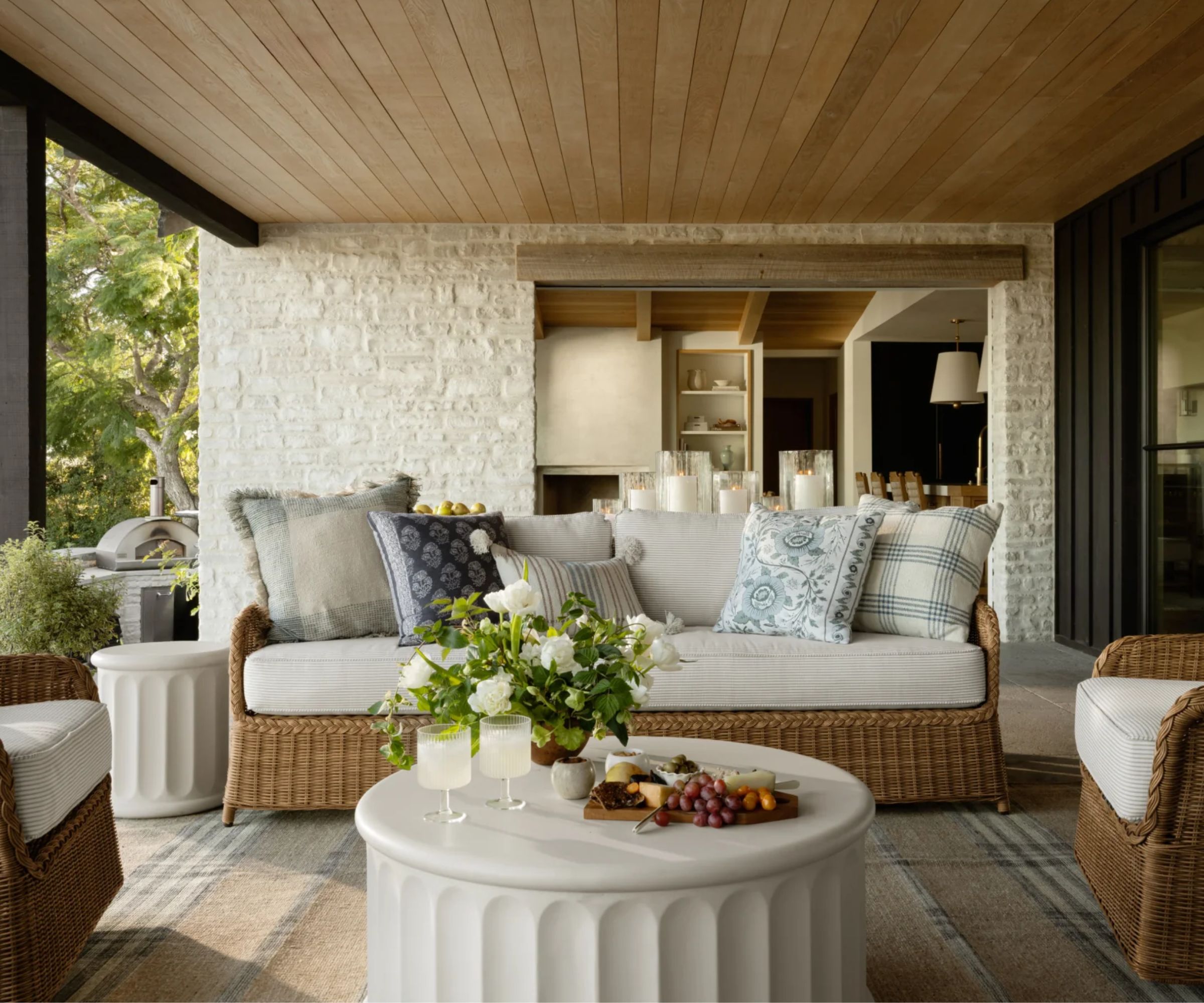
Most outdoor living areas will lead directly from the house into the garden or yard. So it's important to create a strong connection between both spaces, or you will end up with a disjointed look.
The easiest way to achieve this is by borrowing elements like color palettes, textiles, and furniture shapes from your interior spaces to help everything feel seamless. Take your first cue from the dominant shades and styles in the connecting indoor room and echo these outside.
'We look to incorporate colors or textures found in the interior into the outdoor space for visual continuity between the indoor and outdoor areas,' adds Denise Morrison of Morrison Interiors. 'We also look at colors incorporated into the landscape and overall architecture that we can reinterpret into the outdoor space in a fresh way.'
'People want to see a flow from their interiors to their exteriors, and the best way to achieve this seamlessness is through creating an aesthetic that you can carry through both spaces,' adds Jonny Brierley, CEO of outdoor furniture company, Moda Furnishings.
6. Prioritize comfortable furniture choices
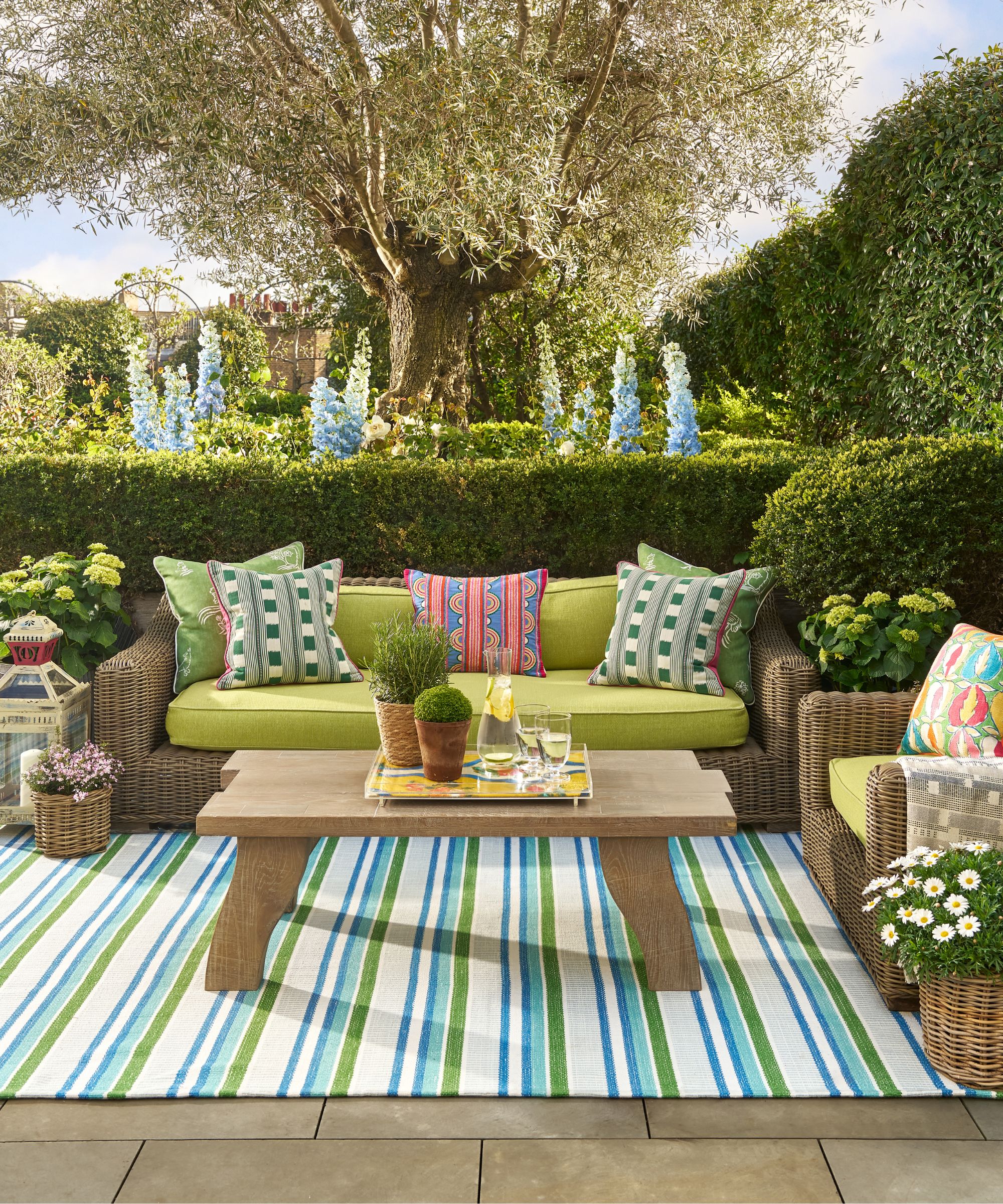
When it comes to your outdoor living room, comfort is absolutely key. The goal is to create a space you’ll actually want to spend time in – whether that’s for a quick morning coffee or an afternoon lounging with a good book – so investing in comfortable furniture is a must.
'Make sure to invest in high-quality outdoor lounge chairs and an outdoor sofa (take a moment to read up on which outdoor materials are going to work best for your climate) so that you'll know you'll be able to have them for years to come; same goes for outdoor upholstery (always go with Sunbrella upholstery),' advises designer Kathy Kuo.
'It makes sense to invest in larger pieces like sofa and tables, and save on trendier items such as pillows if you know you'll change your mind next spring,' adds Bethany Adams. 'Read the product descriptions closely: some pieces marketed for the patio are actually only suitable for "covered areas", and even then, the manufacturer may encourage you to use an additional furniture cover. Depending on your lifestyle and enthusiasm for upkeep, some pieces just may not be worth the hassle.'
And don’t forget the finishing touches that will make your furniture even more inviting. Adding an outdoor rug underfoot will make the area feel grounded and soft, while a mix of side tables and low coffee tables will give everyone a spot for drinks or snacks.
7. Be brave with color and pattern
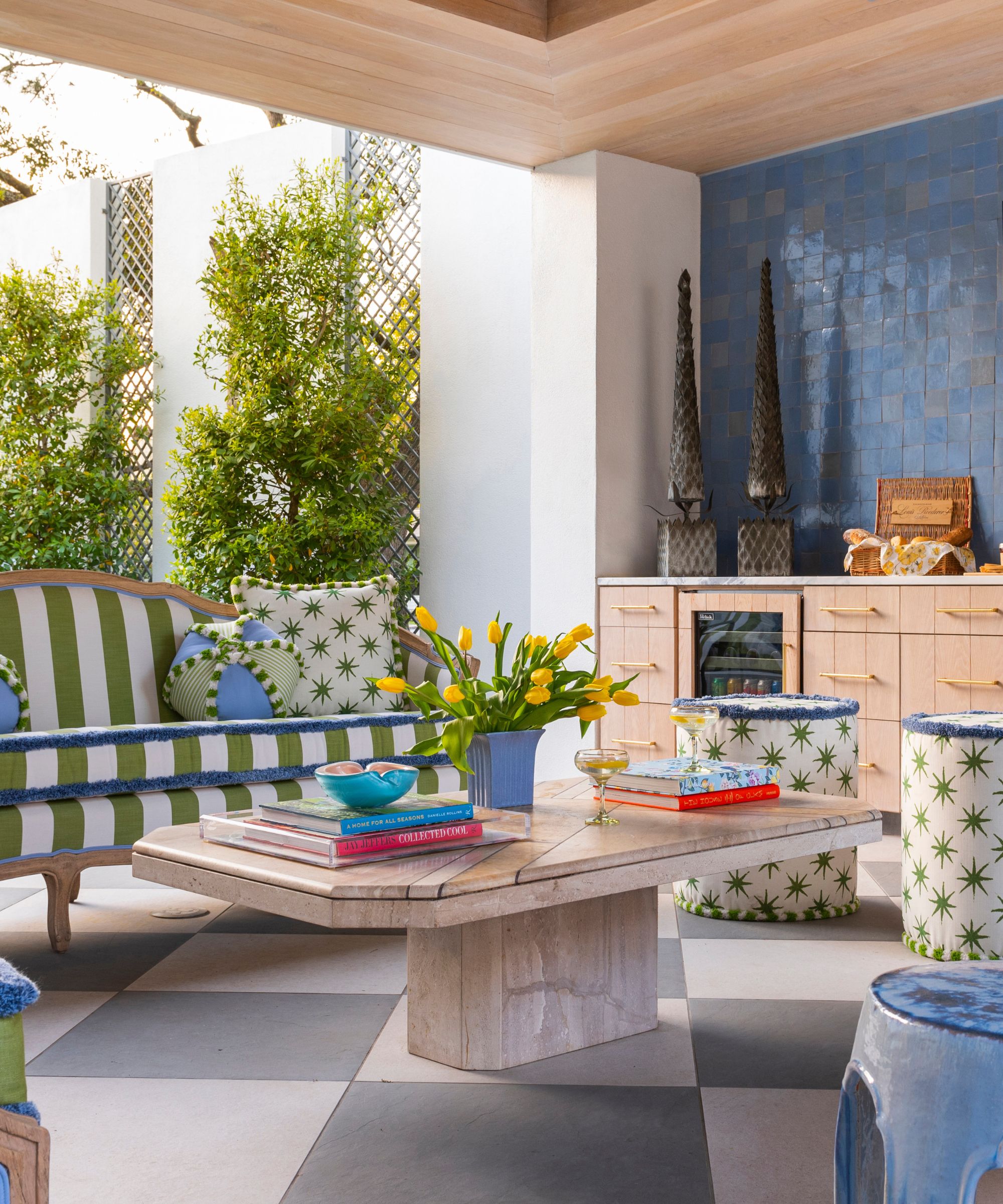
Vibrant hues and playful prints can really come to life against a backdrop of greenery, bringing energy and personality to your setup. Don’t be afraid to mix and match – a bold stripe paired with a floral cushion can look joyful rather than chaotic when balanced across a few pieces.
'I love to continue the color story and general feel of a home’s indoor spaces into the outdoors so that an outdoor living room is really an extension of the home inside,' says Courtnay Tartt Elias of Creative Tonic Design and creator of the playful space seen above.
'Outdoor sofas of similar shape to those indoors, clad in high-performance fabric and dotted with throw pillows, using outdoor lighting with similar finishes and lines as those indoors, and even continuing the same flooring, when possible, allow the outdoor space to flow easily from the indoors,' she advises.
8. Use plants to define the space
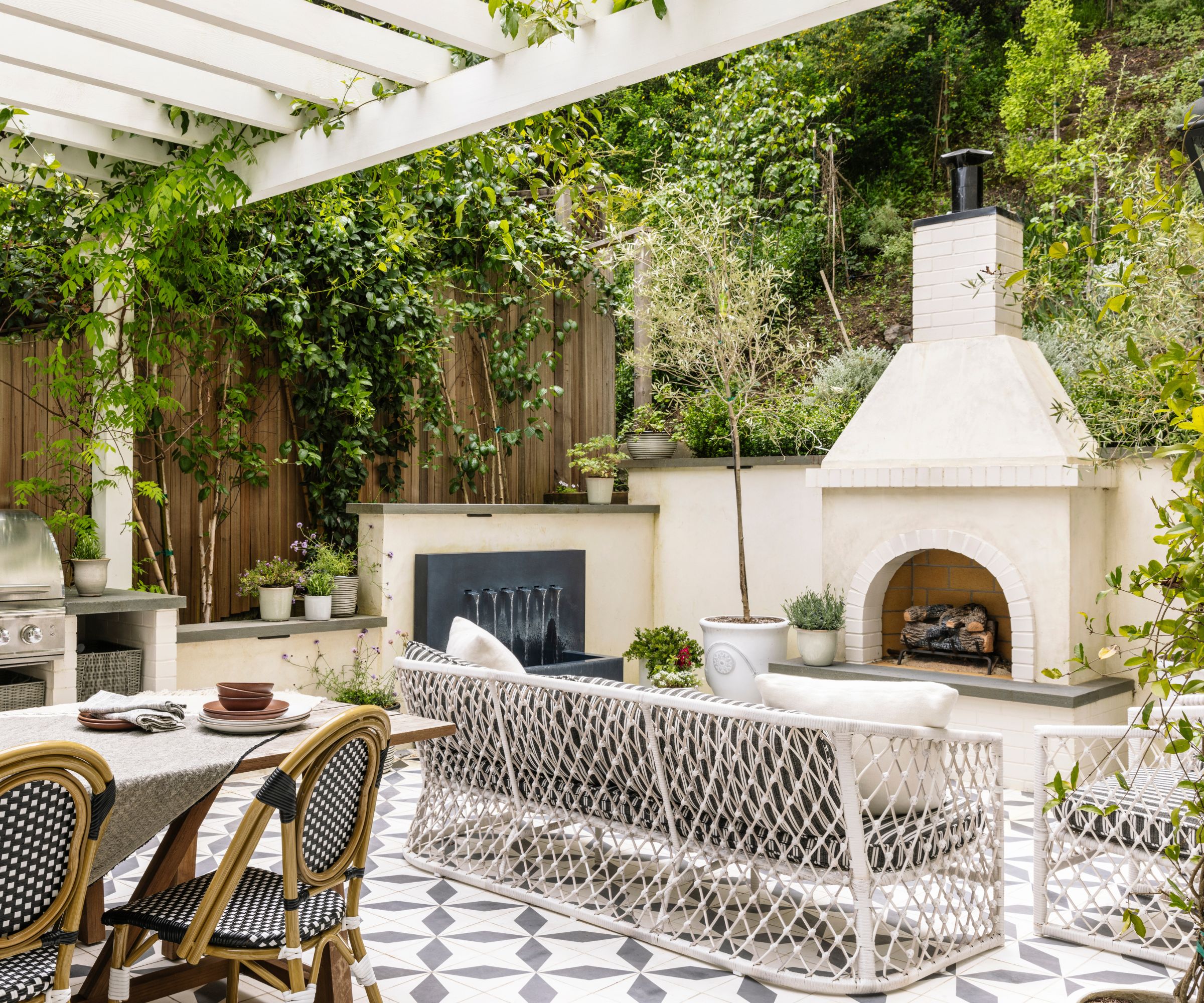
Speaking of zoning, plants give an outdoor seating area life – adding color, texture, and fragrance, which will help your scheme to settle happily into its background or landscape.
This approach will help your outdoor living area to feel totally natural and in place. 'Before you remove established shrubs and trees from your planned outdoor living area, think about how you can work the layout around them, making the most of the green structure and natural framework they provide,' says garden designer, owner of Lucy Conochie Design. 'It may mean choosing a different sofa set or laying a smaller patio, but the visual and wellbeing benefits provided by an established canopy of foliage will more than outweigh this.'
Whilst bringing in planters of exotic palms and creating raised beds of fragrant herbs creates a wonderful ambiance, before you start to plan, consider what you already have.
9. Plan from the floor up
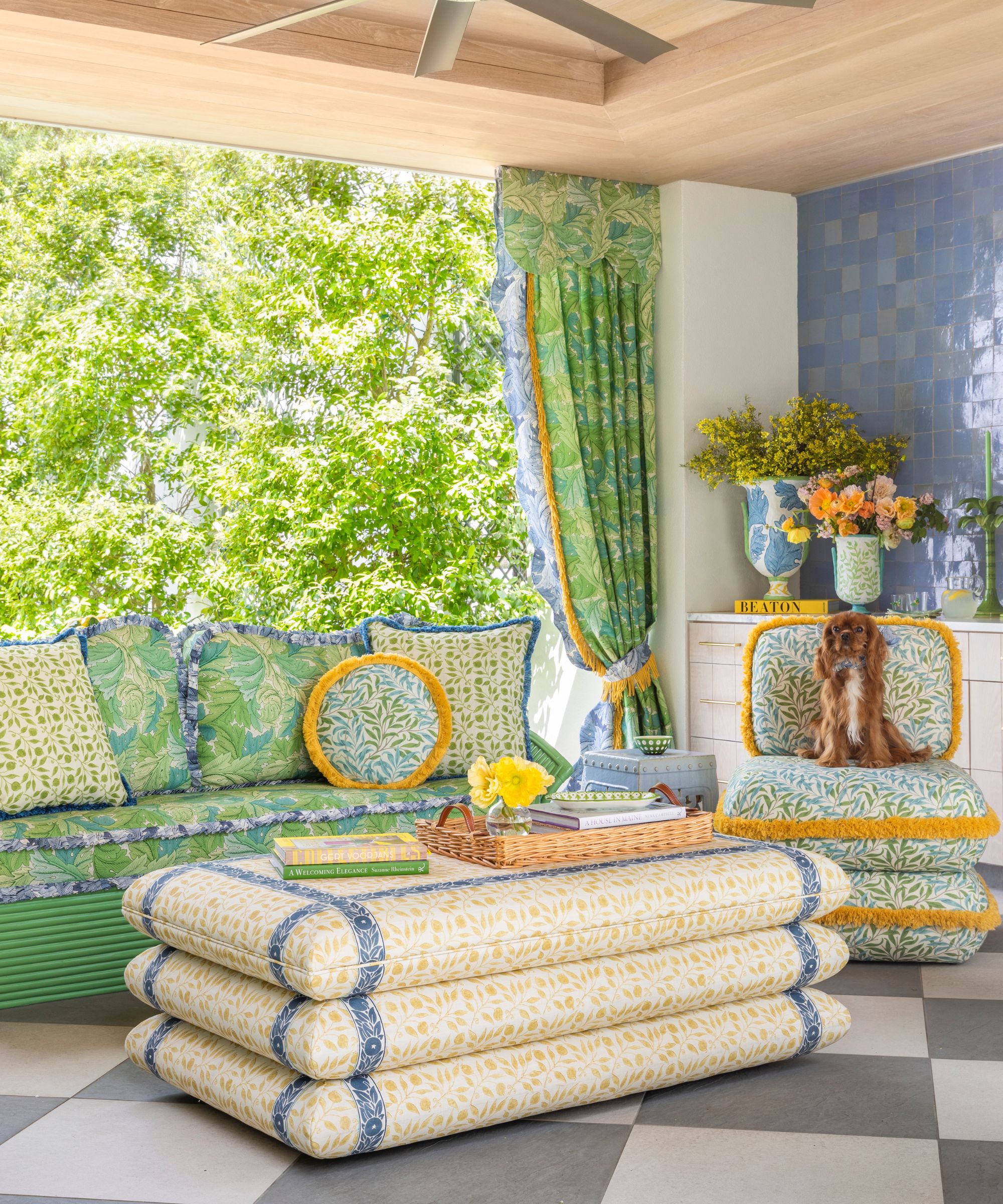
When you’ve settled on your perfect spot and color scheme, plan your patio flooring next. Whatever outdoor furniture you choose, the shades you select, and the plants you bring in, for a coherent whole, everything must work from the bottom up.
If your outdoor space is ultra-modern, with lots of metallic finishes and strong contrasts, high-gloss porcelain floor tiles could look amazingly chic.
However, for most other outdoor living looks, natural is a fail-safe choice; stone paving or timber decking (hardwood is more durable) are favorites. 'Both gravel and cobblestone are very adaptable natural choices, and they sit well with a number of different garden ideas,' adds Susan Spath. I like to use gravel and cobblestone to bring in character. When you mix them together with 24in x 24in pavers (whatever stone it might be) and grass, it adds a different perspective and creates conversation.'
10. Provide ample shelter
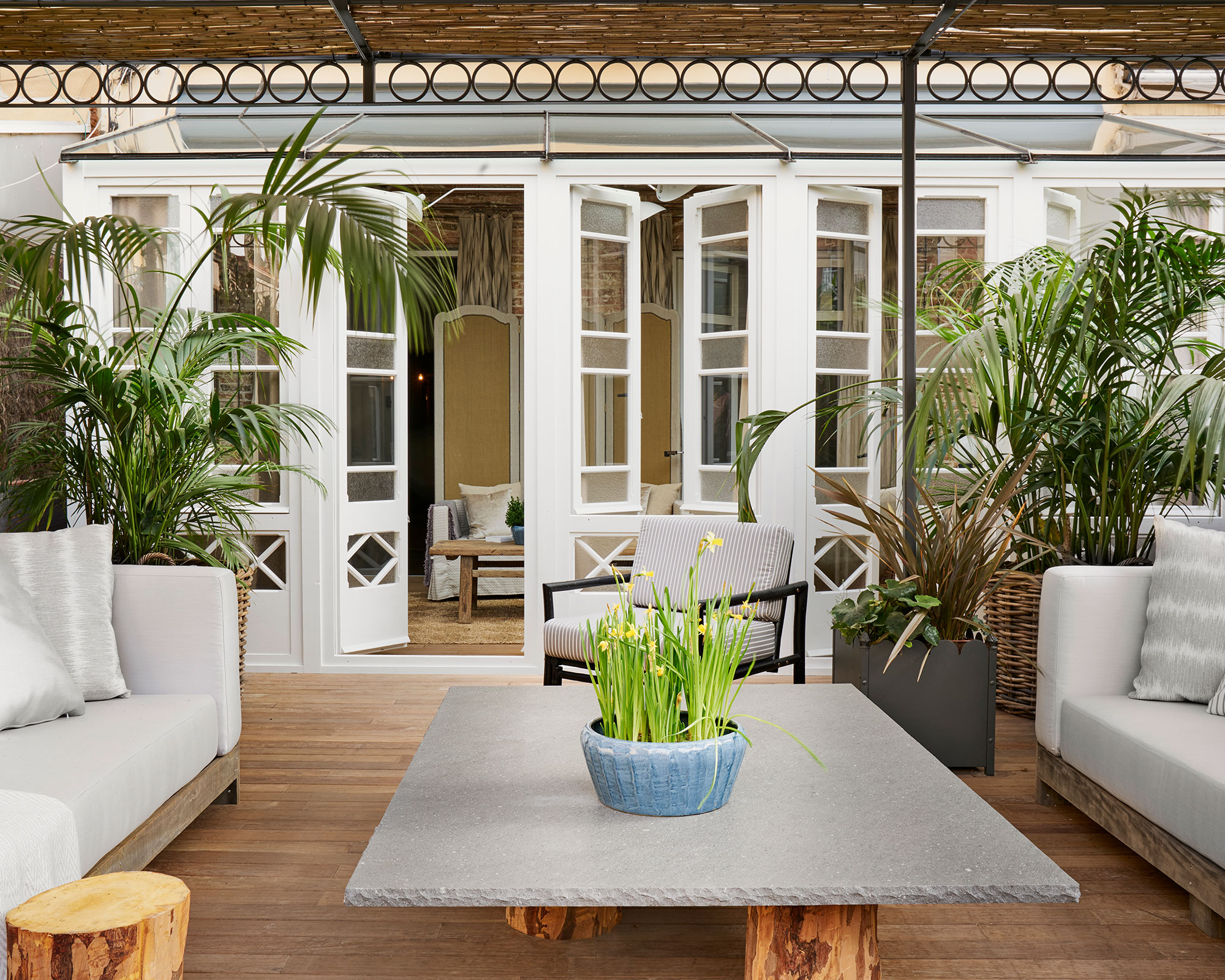
A pergola, gazebo, awning, sail, porch, or overhang from an existing building will provide protection from strong sunlight, extreme temperatures, wind, and the occasional shower of rain.
This can make an amazing impact as a design feature in its own right, or become the centerpiece of an established planting scheme. Visually stunning plants to train up and over freestanding shelters include fragrant wisteria, roses, and, in a sheltered spot, clematis or passionflower. If climate conditions are right, a grapevine weaving its way through a pergola can be a wonderful addition to any outside space.
If your yard is overlooked by neighbors, adding a ‘roof’ will bring privacy as you won’t be looked down upon by those above. This will enhance the feeling that your outside space is a room to be enjoyed just as much as you would indoors.
11. Select high-performance weather-proof materials
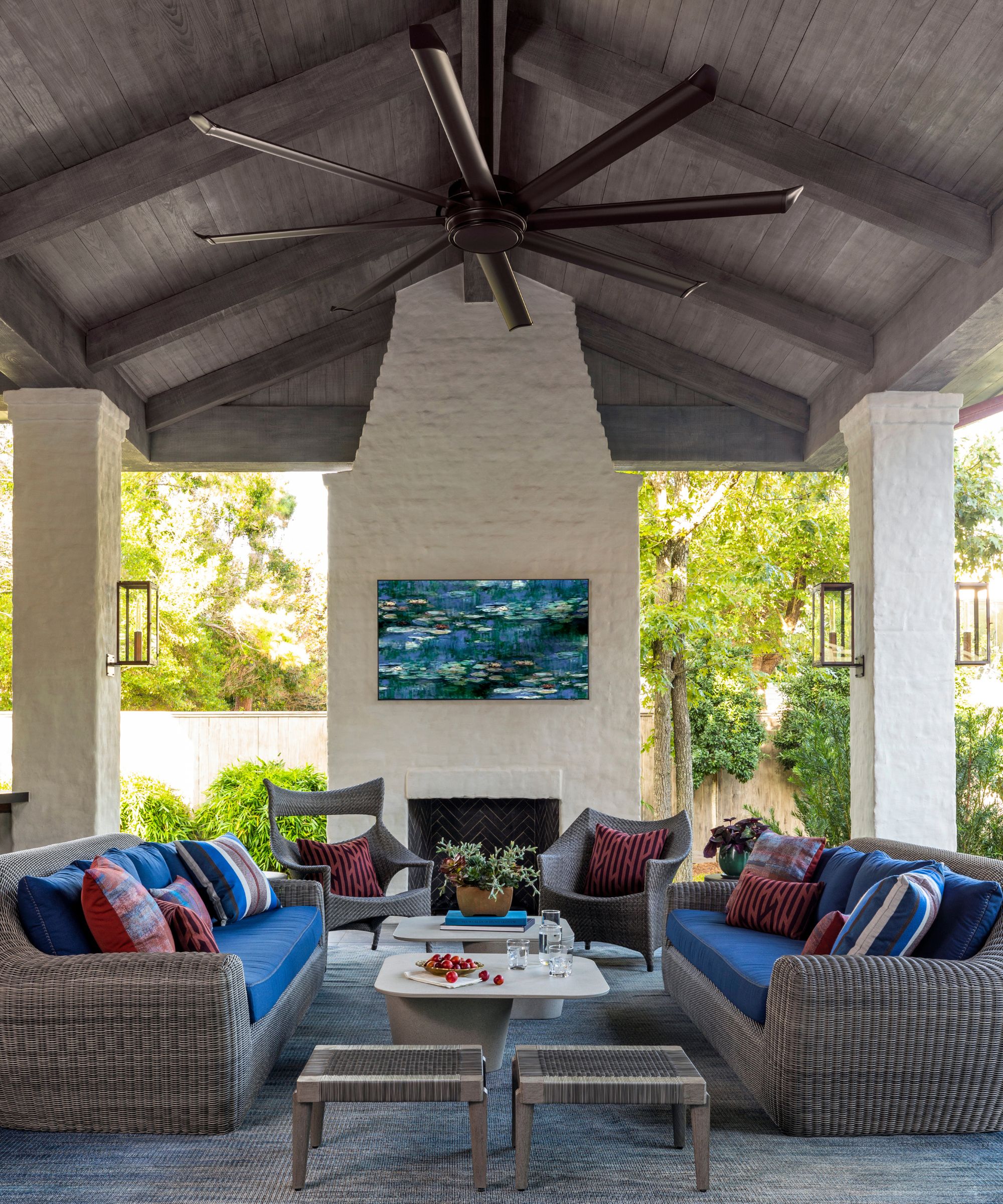
Choosing high-performance and outdoor-friendly fabrics and furniture is crucial for both aesthetics and longevity. Unlike indoor spaces, outdoor areas are exposed to the elements, requiring materials that can withstand varying weather conditions.
Opt for furniture made from materials like teak, aluminum, or all-weather wicker, which are designed to endure sun, rain, and even snow. Equally important is the selection of fabrics that are resistant to fading, moisture, and mildew. Performance fabrics like solution-dyed acrylics and polyesters are specifically engineered for outdoor use, ensuring that your cushions and upholstery remain vibrant and fresh season after season.
'High-performance fabrics were a must when designing this outdoor living space,' says Benjamin Johnston, founder of Benjamin Johnston Design and creator of the space above. 'Make sure to include plenty of comforts when designing an outdoor living room, and accommodate for your climate – if you know it will get hot, make sure there are shaded areas or a fan.'
12. Introduce lighting for ambiance
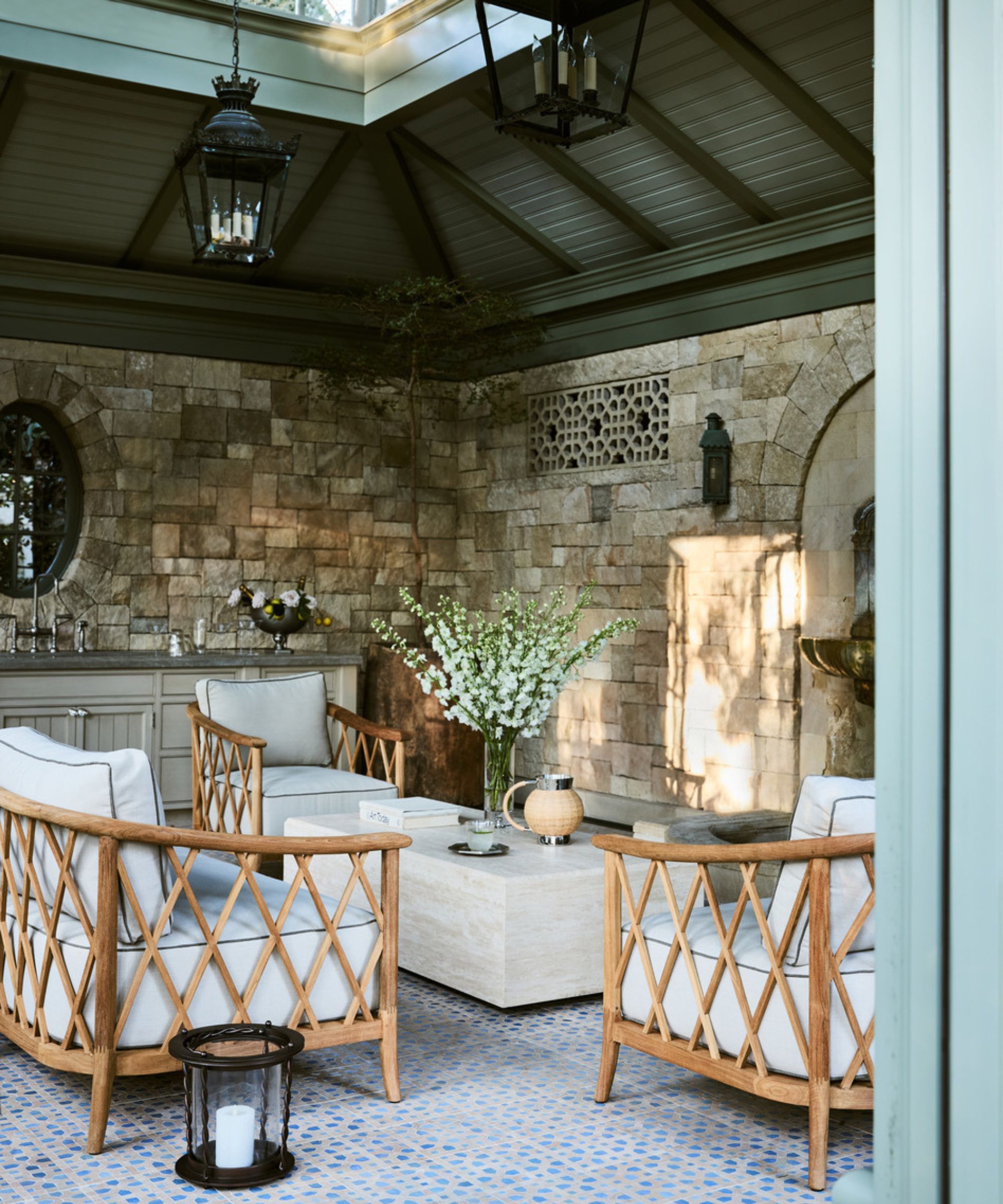
Choosing, organizing, and positioning backyard lighting ideas to create a relaxing outdoor living space can be daunting, so take your time in the planning and consider the outdoor space as a whole.
Before you even start to think about pretty twinkling string lights or dramatic accent spotlights, decide if you’re going to use solar lighting, electric lighting (in which case you’ll need the help of a suitably qualified electrician), or a combination of both.
Follow the same lighting mantra you would indoors: an overhead ceiling light with task lighting for specific activities, so this might include lighting the garden path ideas to your outdoor living area, lanterns, portable table lamps, and fairy lights.
'Position lights within ingresses, sleepers, or garden borders so you see the effect of the light, rather than the light itself,' says Kate Baker, lighting design advisor at smart lighting experts 4lite.
13. Design zones for entertainment
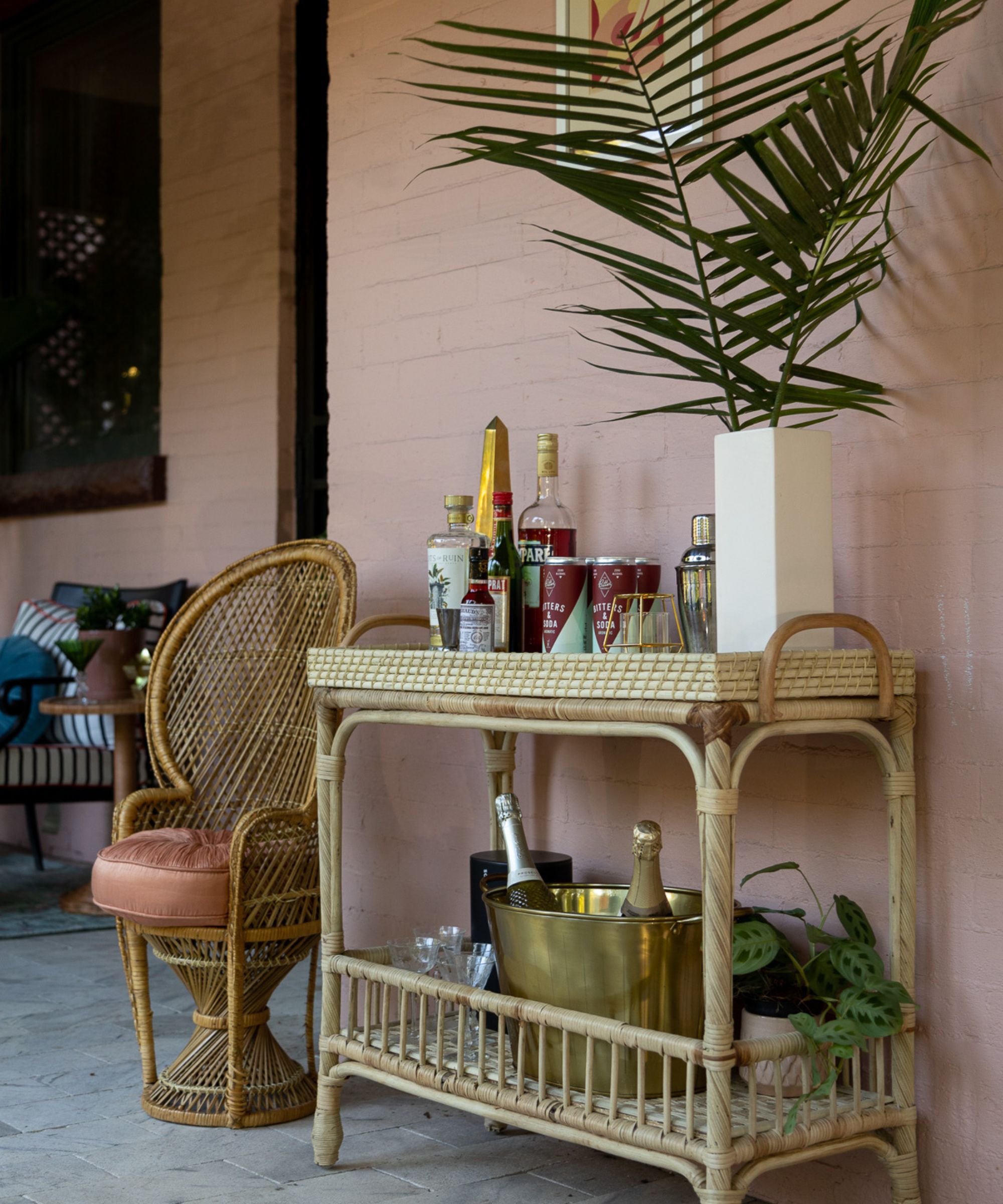
Much like indoors, your outdoor living room is also a versatile and smart space for a myriad of entertaining ideas. Think about music, a television, space for an outdoor kitchen or garden bar, lighting, heating, or a built-in fireplace, and storage niches.
Consider what kinds of entertaining you love – whether it’s casual cocktails on the sofa, big alfresco lunches, or cozy outdoor movie nights – and plan your zones around those habits. Vary the seating options too, from outdoor sofas and armchairs to poufs and floor cushions, so guests can circulate and settle in comfortably.
'Whether it’s indoors or out, comfortable seating requires pieces big enough to lounge on, however many guests you are entertaining,' says Martin Waller, founder of global design house Andrew Martin. 'A mix of both sofas and chairs is key to making sure everyone gets a seat, extra depth means these remain relaxing even with lots of people, and an array of outdoor cushions is essential for both comfort and providing additional seating when necessary.'
14. Gather round a fireplace or firepit
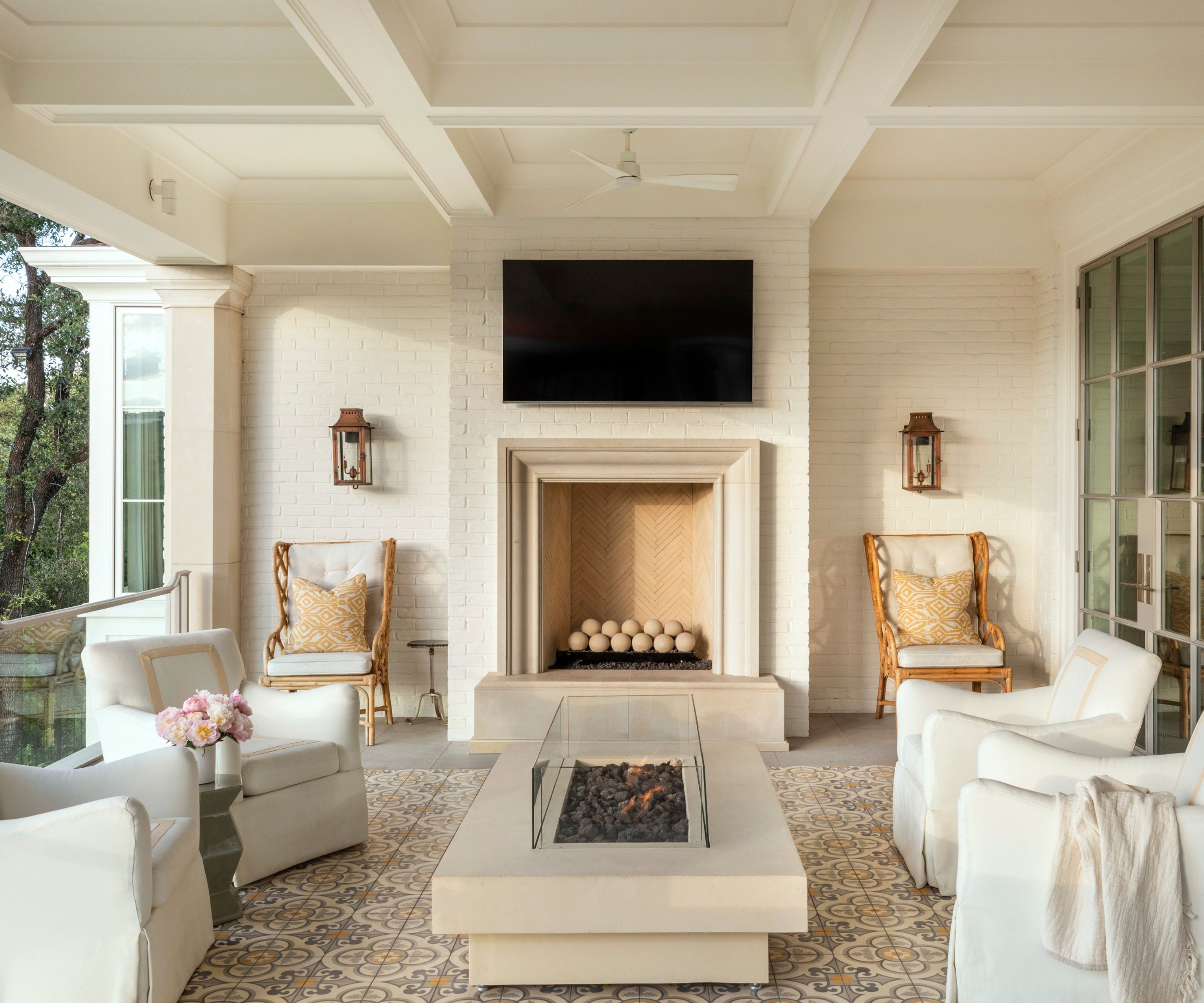
Striking outdoor fireplace ideas are the ultimate centerpiece for gathering around as the sun goes down. The layout of your outdoor furniture can help to inform which style you should look for. A chimenea is a great choice for directing heat to a specific area, like your favorite lounger.
'Seating wrapped around a firepit makes for a great arrangement to encourage conversation, and the warmth from a firepit can offer amazing comfort and visual ambiance,' says Denise Morrison of Morrison Interiors. 'Incorporate weather-resistant materials for durability and add warmth and ambiance with an outdoor rug and throw pillows.'
'I also like the idea of adding some coziness with touches like a fire table and wicker baskets of throw blankets,' adds Kathy Kuo.
15. Provide a connection to your outdoor kitchen
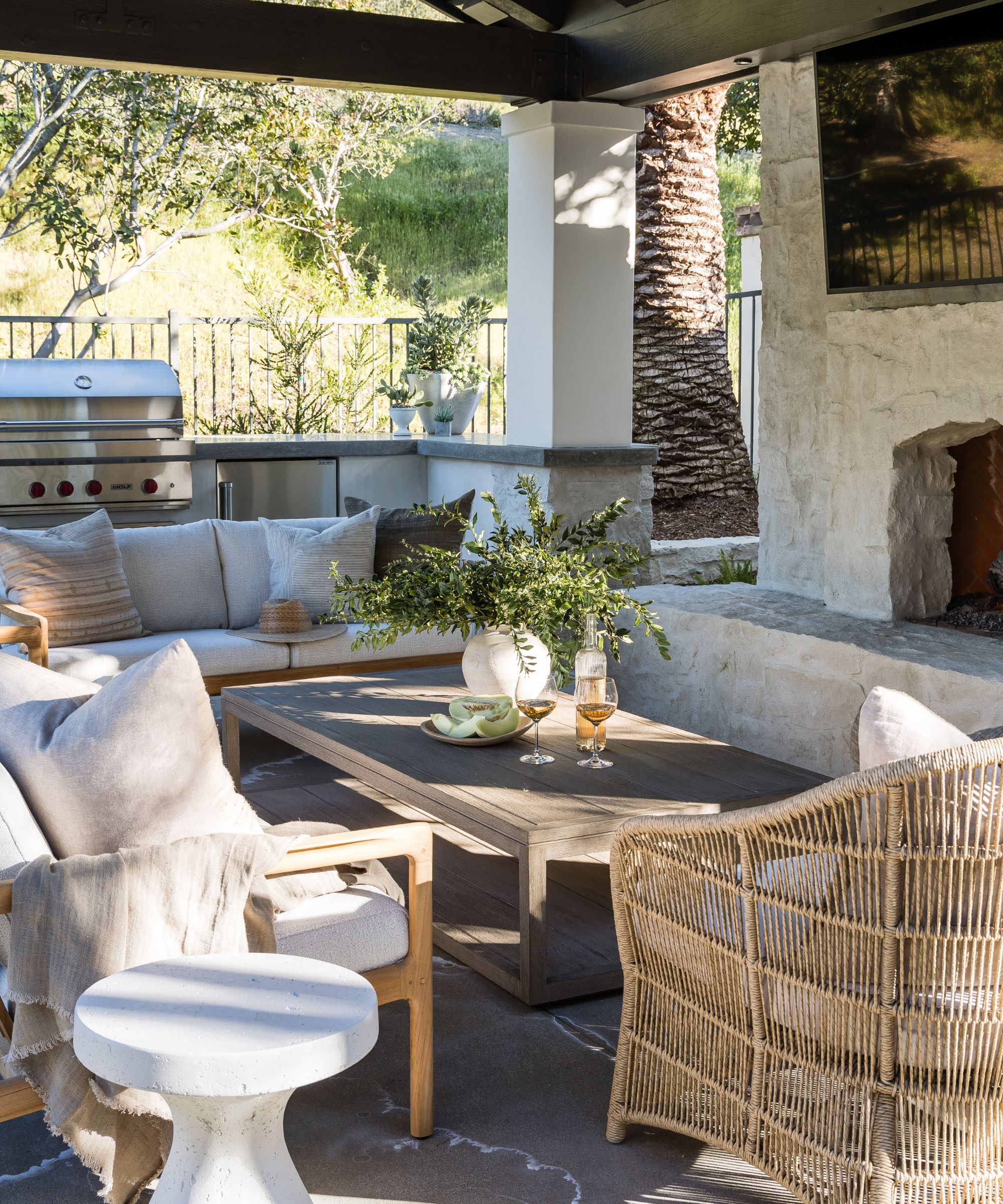
Set up the perfect space this summer for gathering with friends and family by using comfortable furniture and incorporating areas for cooking and dining, too. The key to a successful outdoor living space is connectivity, when your outdoor kitchen and living room are well-integrated, it feels like an extension of your indoor space, promoting ease of movement and socializing.
Outdoor kitchens should be positioned close to the living area, but with enough space to allow for distinct activities without overlap. An island or bar with seating not only provides a spot for guests to gather but also acts as a bridge between cooking and lounging zones.
‘Don’t feel you have to stick to a garden set, here mixing and matching furniture adds character,’ says Sue Jones, who styled this space. If you're looking for small backyard ideas or wondering what to include on a balcony, it’s best to stick to the essentials: extra stools that serve as side tables, floor cushions, and a bistro table set are all good choices.
16. Finally, up the style stakes with accessories and decor
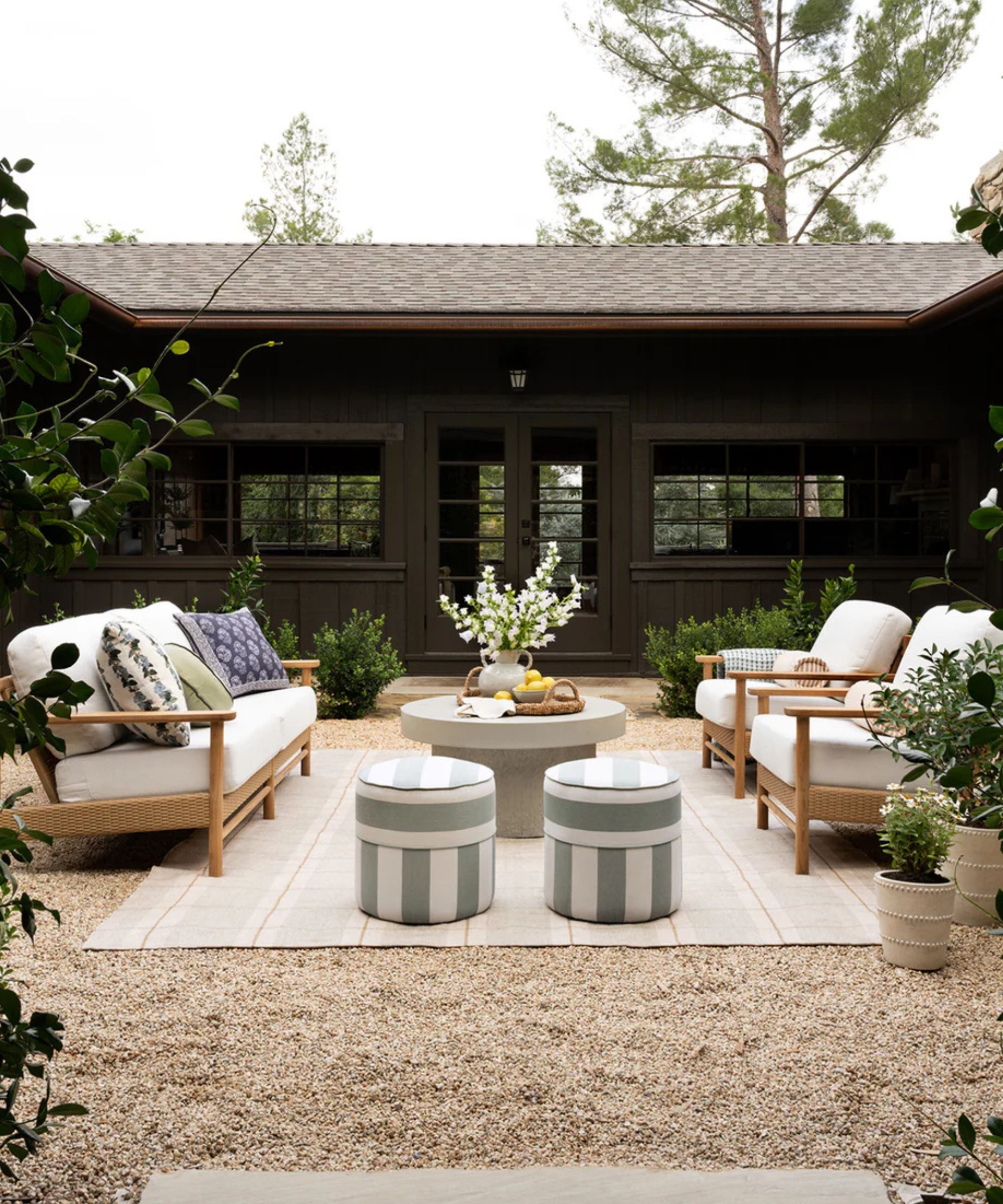
Enhance the comfort and coziness of the space further by ensuring you layer up soft furnishings and accessories. Throws and cushions can change color schemes with ease, while also making the space more inviting.
'Creating an outdoor living room involves selecting comfortable, weather-resistant furniture and incorporating elements like outdoor rugs, throw pillows, and lighting to enhance the cozy, indoor feel,' suggests Ginger Curtis of Urbanology Designs. 'Adding greenery and a focal point, such as a fire pit or water feature, can also elevate the space and make it inviting for relaxation and dining al fresco! '
Outdoor rugs heighten the ‘zoned’ feeling of the area, while adding another layer of comfort. Finish by lighting as you would indoors, with outdoor lighting ideas such as freestanding garden floor lamps, hurricane lamps, or even candles.
Shop outdoor living room essentials
For some of the prettiest and most unique outdoor rugs, the Sarah Sherman Samuel collection at Lulu and Georgia has some lovely prints and colors. I love the deep rusty tones of this illustrated design.
If you're looking for some of the best Amazon outdoor furniture, this boho-style sectional boasts some really good reviews and is a great price for two corner chairs, four armless chairs, and a glass-topped coffee table.
This floral-meets-stripe cushion, designed in Shea McGee's signature classic style, is pretty, versatile, and durable enough to use both indoors and out, thanks to its soft fabrication and weather-resistant coating.
A fire pit that doubles up as a chic coffee table is a great buy for making your outdoor living room feel cozier. This delivers 50,000 BTUs of warmth with adjustable flames that help you to set the mood.
Designed by Joanna Gaines for her Hearth & Hand™ with Magnolia at Target range, this retro-style portable lamp is perfect for hosting well into the evening. You can place it on a side table or a coffee table, or even hang it up.
Add in some extra color and print with a little outdoor ottoman. Not only is this super chic, but so versatile – you can use it as a foot rest or an extra seat, and it should last for years thanks to its outdoor-treated fabric.
FAQs
How do I create an outdoor living room?
Use every opportunity to entertain al fresco style or just to enjoy living in your garden this summer. With furniture and accessories that don’t cost the earth, it is even easier than ever to create that outside room you’ve always dreamed of.
Before you buy anything too big and bulky, think about where you’ll store it out of season. Folding loungers take up less shed-space than fixed loungers, which can be bulky and awkward to manoeuvre, although they can often be stacked vertically.
Modular units are easy to take apart and can be stacked on top of each other in a shed or garage.
When it comes to cushions, make sure they’re detachable so you can take them off and store them away overnight or in bad weather, with zip-off covers that are easy to wash.
For poolside loungers, avoid cushions altogether and opt for Textilene, a stretchy PVC mesh sling that is waterproof and dries off quickly. The surface is springy, making it ultra comfy to lie on.
How can I make my outdoor living space look bigger?
'Embrace the space you have and follow this season’s ‘cozy garden’ trend by arranging your garden furniture in a circle, says garden designer Jo Thompson. 'Doing this will give a more embracing feel.'
Thinking of a modest yard as a living room will make the most of its limited proportions, so bring in throws and cushions to stress comfort over spacious proportions. You might think white walls and fences will make the space appear larger, but this choice can create a clinical space that works best in warmer climates. Choose earthy natural tones of soft terracotta and olive green instead.
Erika Woelfel, vice-president of color and creative services at Behr Paint Company likes Secret Meadow, a deep olive-ish green: 'It adds a sense of intrigue for guests about to enter your garden or backyard hideaway.'
How can I make my indoor and outdoor living space flow together?
Start with the flooring. If you have wooden floorboards indoors, lay decking in the same direction and choose a complementary shade for the deck stain. Keep entryways between inside and outside clear of furniture and other items such as large plant pots which make a statement but can create a visual blockage. If your outdoor space is accessed through a set of doors, it’s good if the threshold (the strip at the bottom of the frame) can be level, so there is no step between both indoors and outside.
When deciding on outdoor living furniture, take cues from the closest indoor room to the garden to help the spaces flow seamlessly together.







